七年级下册英语unit-单元全册知识点归纳与复习教案
- 格式:doc
- 大小:83.50 KB
- 文档页数:11
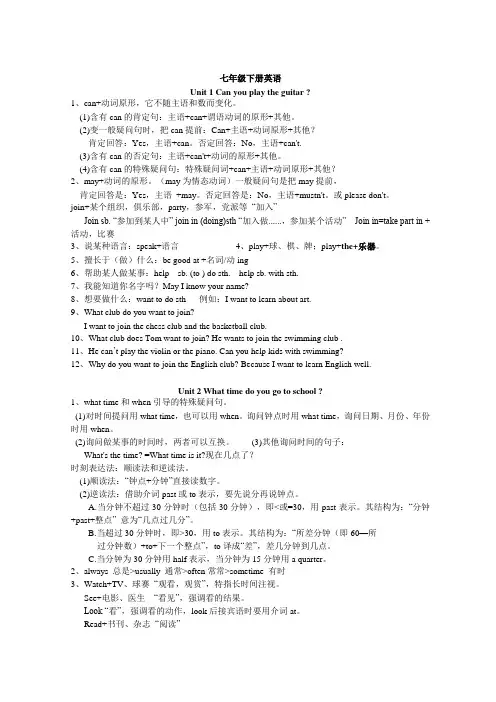
七年级下册英语Unit 1 Can you play the guitar ?1、can+动词原形,它不随主语和数而变化。
(1)含有can的肯定句:主语+can+谓语动词的原形+其他。
(2)变一般疑问句时,把can提前:Can+主语+动词原形+其他?肯定回答:Yes,主语+can。
否定回答:No,主语+can't.(3)含有can的否定句:主语+can't+动词的原形+其他。
(4)含有can的特殊疑问句:特殊疑问词+can+主语+动词原形+其他?2、may+动词的原形。
(may为情态动词)一般疑问句是把may提前,肯定回答是:Yes,主语+may。
否定回答是:No,主语+mustn't。
或please don't。
join+某个组织,俱乐部,party,参军,党派等“加入”Join sb. “参加到某人中” join in (doing)sth “加入做......,参加某个活动” Join in=take part in +活动,比赛3、说某种语言:speak+语言4、play+球、棋、牌;play+the+乐器。
5、擅长于(做)什么:be good at +名词/动ing6、帮助某人做某事:help sb. (to ) do sth. help sb. with sth.7、我能知道你名字吗?May I know your name?8、想要做什么:want to do sth 例如:I want to learn about art.9、What club do you want to join?I want to join the chess club and the basketball club.10、What club does Tom want to join? He wants to join the swimming club .11、He can’t play the violin or the piano. Can you help kids with swimming?12、Why do you want to join the English club? Because I want to learn English well.Unit 2 What time do you go to school ?1、what time和when引导的特殊疑问句。
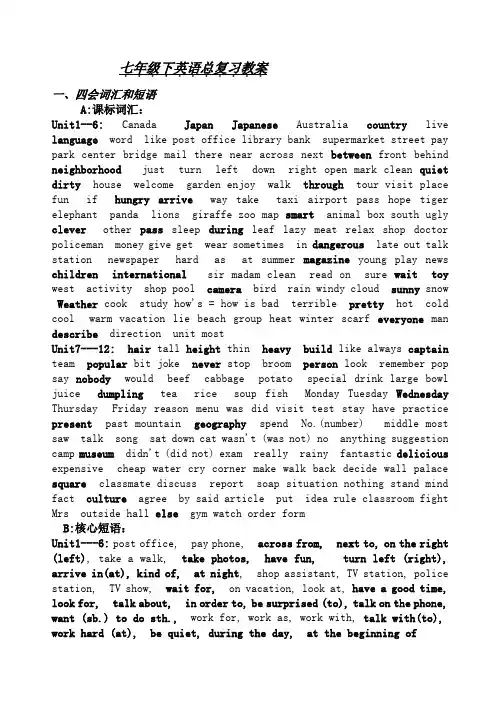
七年级下英语总复...........习教案一、四会词汇和短语A:课标词汇:Unit1--6: Canada Japan Japanese Australia country live language word like post office library bank supermarket street pay park center bridge mail there near across next between front behind neighborhood just turn left down right open mark clean quiet dirty house welcome garden enjoy walk through tour visit place fun if hungry arrive way take taxi airport pass hope tiger elephant panda lions giraffe zoo map smart animal box south ugly clever other pass sleep during leaf lazy meat relax shop doctor policeman money give get wear sometimes in dangerous late out talk station newspaper hard as at summer magazine young play news children international sir madam clean read on sure wait toy west activity shop pool camera bird rain windy cloud sunny snow Weather cook study how's = how is bad terrible pretty hot cold cool warm vacation lie beach group heat winter scarf everyone man describe direction unit mostUnit7---12: hair tall height thin heavy build like always captain team popular bit joke never stop broom person look remember pop say nobody would beef cabbage potato special drink large bowl juice dumpling tea rice soup fish Monday Tuesday Wednesday Thursday Friday reason menu was did visit test stay have practice present past mountain geography spend No.(number) middle most saw talk song sat down cat wasn't (was not) no anything suggestion camp museum didn't (did not) exam really rainy fantastic delicious expensive cheap water cry corner make walk back decide wall palace square classmate discuss report soap situation nothing stand mind fact culture agree by said article put idea rule classroom fight Mrs outside hall else gym watch order formB:核心短语:Unit1---6:post office, pay phone, across from, next to, on the right (left), take a walk, take photos, have fun, turn left (right), arrive in(at), kind of, at night, shop assistant, TV station, police station, TV show, wait for, on vacation, look at, have a good time, look for, talk about, in order to, be surprised (to), talk on the phone, want (sb.) to do sth., work for, work as, work with, talk with(to), work hard (at), be quiet, during the day, at the beginning ofUnit7---12: a little bit, stop to do sth. ( Stop doing sth.),like doing sth., go shopping,look like, would like (to) do sth., stay at home, do some reading (shopping), have a party, s tudy for the rest, go to the movies,play the guitar, play soccer(basketball), spend ...doing(on) sth., e njoy doing sth., go for a walk,have fun doing sth.,decide to do sth., talk show, soap opera, sports show, think of, tell sb. to do sth., have to, in fact,be late for二、考点分析1、look,看,①是系动词,后可跟形容词,如,look good, look sad, look worried,look beautiful;②还可以是行为动词,表动作,并能组成许多短语,如,look at(向...看),look out of(向...外看),look for(寻找),look after(照看)=take care of, look like(看起来象...)等。
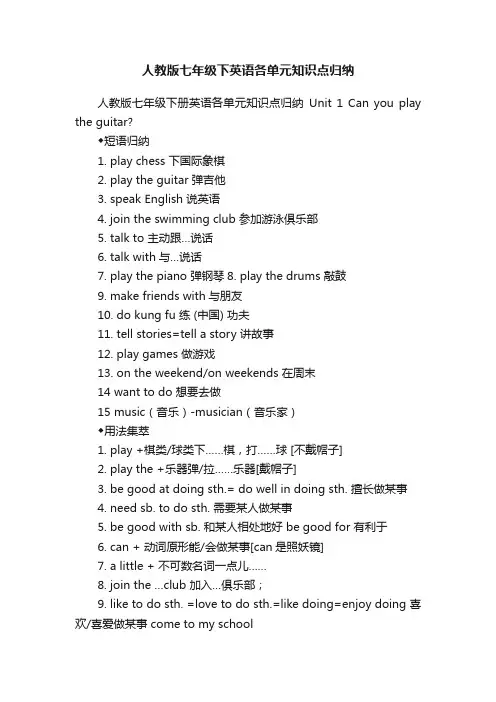
人教版七年级下英语各单元知识点归纳人教版七年级下册英语各单元知识点归纳Unit 1 Can you play the guitar?◆短语归纳1. play chess 下国际象棋2. play the guitar 弹吉他3. speak English 说英语4. join the swimming club 参加游泳俱乐部5. talk to 主动跟…说话6. talk with与…说话7. play the piano 弹钢琴8. play the drums 敲鼓9. make friends with与朋友10. do kung fu 练 (中国) 功夫11. tell stories=tell a story 讲故事12. play games 做游戏13. on the weekend/on weekends 在周末14 want to do 想要去做15 music(音乐)-musician(音乐家)◆用法集萃1. play +棋类/球类下……棋,打……球 [不戴帽子]2. play the +乐器弹/拉……乐器[戴帽子]3. be good at doing sth.= do well in doing sth. 擅长做某事4. need sb. to do sth. 需要某人做某事5. be good with sb. 和某人相处地好 be good for 有利于6. can + 动词原形能/会做某事[can是照妖镜]7. a little + 不可数名词一点儿……8. join the …c lub 加入…俱乐部;9. like to do sth. =love to do sth.=like doing=enjoy doing 喜欢/喜爱做某事 come to my school◆典句必背1. Can you draw? Yes, I can. / No, I can’t.2. What club do you want to join? I want to join the chess club.3. You can join the English club.4. Sounds good./That sounds good.5 What can you do?6. I can speak English and I can also play soccer.7. Please call Mrs. Miller at 555-3721. 8.tell sb (not)to do 告诉某人(不)要去做某事。

—-可编辑修改,可打印——别找了你想要的都有!精品教育资料——全册教案,,试卷,教学课件,教学设计等一站式服务——全力满足教学需求,真实规划教学环节最新全面教学资源,打造完美教学模式复习教案Unit 1 Can you play the guitar ?1、can+动词原形,它不随主语和数而变化。
(1)含有can的肯定句:主语+can+谓语动词的原形+其他。
(2)变一般疑问句时,把can提前:Can+主语+动词原形+其他?肯定回答:Yes,主语+can。
否定回答:No,主语+can't.(3)含有can的否定句:主语+can't+动词的原形+其他。
(4)含有can的特殊疑问句:特殊疑问词+can+主语+动词原形+其他?2、may+动词的原形。
(may为情态动词)一般疑问句是把may提前,肯定回答是:Yes,主语+may。
否定回答是:No,主语+mustn't。
或please don't。
join+某个组织,俱乐部,party,参军,党派等“加入”Join sb. “参加到某人中”join in (doing)sth “加入做......,参加某个活动”Join in=take part in +活动,比赛3、说某种语言:speak+语言4、play+球、棋、牌;play+the+乐器。
5、擅长于(做)什么:be good at +名词/动ing6、帮助某人做某事:help sb. (to ) do sth. help sb. with sth.7、我能知道你名字吗?May I know your name?8、想要做什么:want to do sth 例如:I want to learn about art.9、What club do you want to join?I want to join the chess club and the basketball club.10、What club does Tom want to join? He wants to join the swimming club .11、He can’t play the violin or the piano. Can you help kids with swimming?12、Why do you want to join the English club? Because I want to learn English well.Unit 2 What time do you go to school ?1、what time和when引导的特殊疑问句。
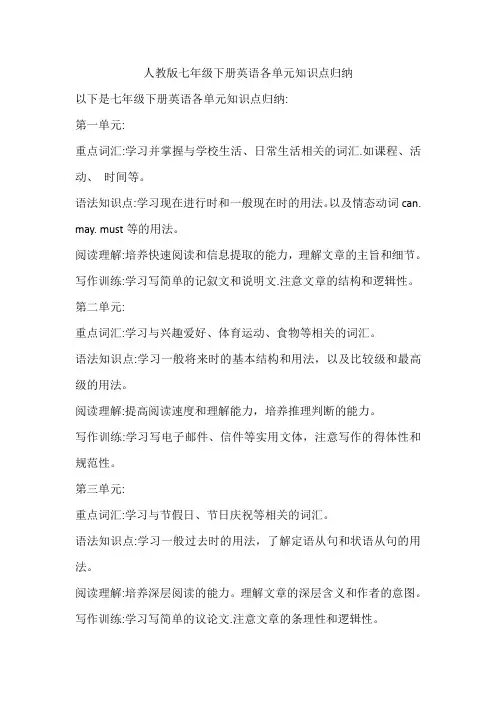
人教版七年级下册英语各单元知识点归纳
以下是七年级下册英语各单元知识点归纳:
第一单元:
重点词汇:学习并掌握与学校生活、日常生活相关的词汇.如课程、活动、时间等。
语法知识点:学习现在进行时和一般现在时的用法。
以及情态动词can. may. must等的用法。
阅读理解:培养快速阅读和信息提取的能力,理解文章的主旨和细节。
写作训练:学习写简单的记叙文和说明文.注意文章的结构和逻辑性。
第二单元:
重点词汇:学习与兴趣爱好、体育运动、食物等相关的词汇。
语法知识点:学习一般将来时的基本结构和用法,以及比较级和最高级的用法。
阅读理解:提高阅读速度和理解能力,培养推理判断的能力。
写作训练:学习写电子邮件、信件等实用文体,注意写作的得体性和规范性。
第三单元:
重点词汇:学习与节假日、节日庆祝等相关的词汇。
语法知识点:学习一般过去时的用法,了解定语从句和状语从句的用法。
阅读理解:培养深层阅读的能力。
理解文章的深层含义和作者的意图。
写作训练:学习写简单的议论文.注意文章的条理性和逻辑性。
第四单元:
重点词汇:学习与旅行、旅游景点等相关的词汇。
语法知识点:了解并列句和并列复合句的构成和用法,以及宾语从句的用法。
阅读理解:提高推理判断的能力。
能回答关于文章细节、深层含义和作者观点等方面的问题。
写作训练:学习写复杂的记叙文.说明文和议论文。
注意文章的拓展和创新性。
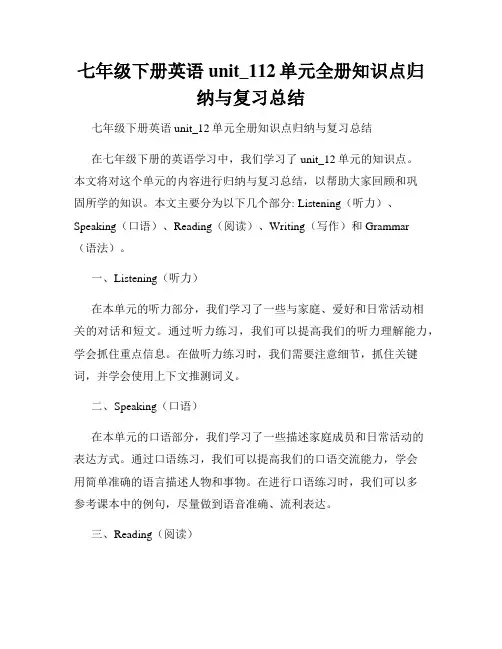
七年级下册英语unit_112单元全册知识点归纳与复习总结七年级下册英语unit_12单元全册知识点归纳与复习总结在七年级下册的英语学习中,我们学习了unit_12单元的知识点。
本文将对这个单元的内容进行归纳与复习总结,以帮助大家回顾和巩固所学的知识。
本文主要分为以下几个部分: Listening(听力)、Speaking(口语)、Reading(阅读)、Writing(写作)和Grammar(语法)。
一、Listening(听力)在本单元的听力部分,我们学习了一些与家庭、爱好和日常活动相关的对话和短文。
通过听力练习,我们可以提高我们的听力理解能力,学会抓住重点信息。
在做听力练习时,我们需要注意细节,抓住关键词,并学会使用上下文推测词义。
二、Speaking(口语)在本单元的口语部分,我们学习了一些描述家庭成员和日常活动的表达方式。
通过口语练习,我们可以提高我们的口语交流能力,学会用简单准确的语言描述人物和事物。
在进行口语练习时,我们可以多参考课本中的例句,尽量做到语音准确、流利表达。
三、Reading(阅读)在本单元的阅读部分,我们学习了一些关于家庭、爱好和日常活动的短文。
通过阅读这些短文,我们可以提高我们的阅读理解能力,学会从文章中获取信息。
在做阅读练习时,我们需要注意文章的结构和组织方式,抓住关键信息。
四、Writing(写作)在本单元的写作部分,我们学习了一些描述家庭、爱好和日常活动的写作表达。
通过写作练习,我们可以提高我们的写作能力,学会用简单明了的语言表达自己的观点。
在进行写作练习时,我们需要注意文章的结构和组织,合理安排段落和句子。
五、Grammar(语法)在本单元的语法部分,我们学习了一些关于现在进行时和一般现在时的用法。
通过学习这些语法知识,我们可以正确地描述正在进行的动作和经常发生的动作。
在运用这些语法知识时,我们需要注意动词的变化和句子的时态一致性。
综上所述,七年级下册英语unit_12单元的内容主要包括Listening、Speaking、Reading、Writing和Grammar。
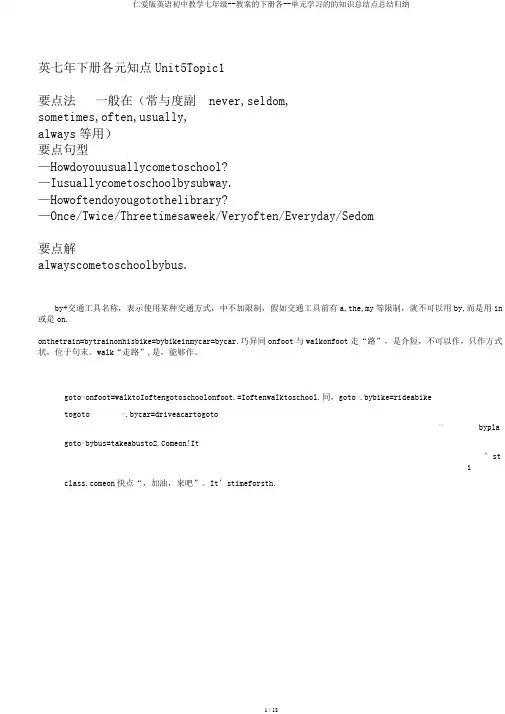
仁爱版英语初中教学七年级--教案的下册各--单元学习的的知识总结点总结归纳英七年下册各元知点Unit5Topic1要点法一般在(常与度副never,seldom,sometimes,often,usually,always等用)要点句型—Howdoyouusuallycometoschool?—Iusuallycometoschoolbysubway.—Howoftendoyougotothelibrary?—Once/Twice/Threetimesaweek/Veryoften/Everyday/Sedom要点解alwayscometoschoolbybus.by+交通工具名称,表示使用某种交通方式,中不加限制,假如交通工具前有a,the,my等限制,就不可以用by,而是用in 或是on.onthetrain=bytrainonhisbike=bybikeinmycar=bycar.巧异同onfoot与walkonfoot走“路”,是介短,不可以作,只作方式状,位于句末。
walk“走路”,是,能够作。
goto⋯onfoot=walktoIoftengotoschoolonfoot.=Ioftenwalktoschool.同,goto⋯.bybike=rideabiketogoto ⋯.bycar=driveacartogoto⋯byplagoto⋯bybus=eon!It’sti eon快点“,加油,来吧”。
It’stimeforsth.“该做某事了”,与It’stimetodosth意思.同样。
3.look的短语lookthesame看起来同样looklike看起来像,,lookfor找寻lookafter照料4.domyhomeworkatschool在学校造作业doone’shomework做家庭作业(注意:one’要s随主语的变化而变化,常用形容词性物主代词my,your,their,our,his,her等)。
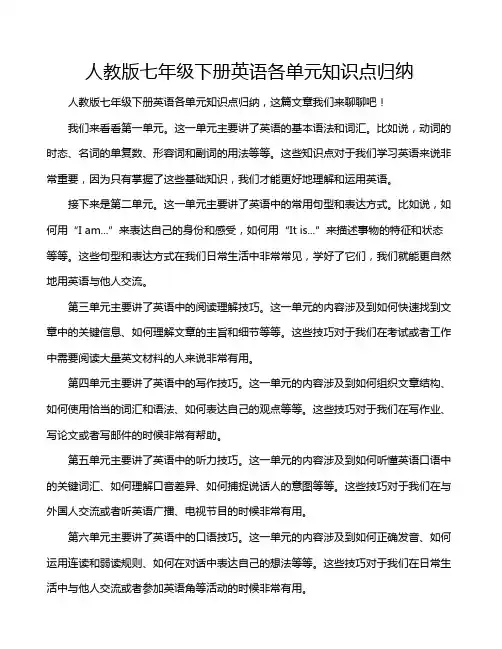
人教版七年级下册英语各单元知识点归纳人教版七年级下册英语各单元知识点归纳,这篇文章我们来聊聊吧!我们来看看第一单元。
这一单元主要讲了英语的基本语法和词汇。
比如说,动词的时态、名词的单复数、形容词和副词的用法等等。
这些知识点对于我们学习英语来说非常重要,因为只有掌握了这些基础知识,我们才能更好地理解和运用英语。
接下来是第二单元。
这一单元主要讲了英语中的常用句型和表达方式。
比如说,如何用“I am...”来表达自己的身份和感受,如何用“It is...”来描述事物的特征和状态等等。
这些句型和表达方式在我们日常生活中非常常见,学好了它们,我们就能更自然地用英语与他人交流。
第三单元主要讲了英语中的阅读理解技巧。
这一单元的内容涉及到如何快速找到文章中的关键信息、如何理解文章的主旨和细节等等。
这些技巧对于我们在考试或者工作中需要阅读大量英文材料的人来说非常有用。
第四单元主要讲了英语中的写作技巧。
这一单元的内容涉及到如何组织文章结构、如何使用恰当的词汇和语法、如何表达自己的观点等等。
这些技巧对于我们在写作业、写论文或者写邮件的时候非常有帮助。
第五单元主要讲了英语中的听力技巧。
这一单元的内容涉及到如何听懂英语口语中的关键词汇、如何理解口音差异、如何捕捉说话人的意图等等。
这些技巧对于我们在与外国人交流或者听英语广播、电视节目的时候非常有用。
第六单元主要讲了英语中的口语技巧。
这一单元的内容涉及到如何正确发音、如何运用连读和弱读规则、如何在对话中表达自己的想法等等。
这些技巧对于我们在日常生活中与他人交流或者参加英语角等活动的时候非常有用。
第七单元主要讲了英语中的文化知识。
这一单元的内容涉及到英美文化的差异、英国历史和地理等方面的知识。
了解这些知识可以帮助我们更好地理解和运用英语,同时也可以增进我们对不同文化的理解和尊重。
人教版七年级下册英语各单元知识点归纳是非常重要的一本书,它涵盖了许多我们在学习英语过程中需要掌握的基础知识和技能。
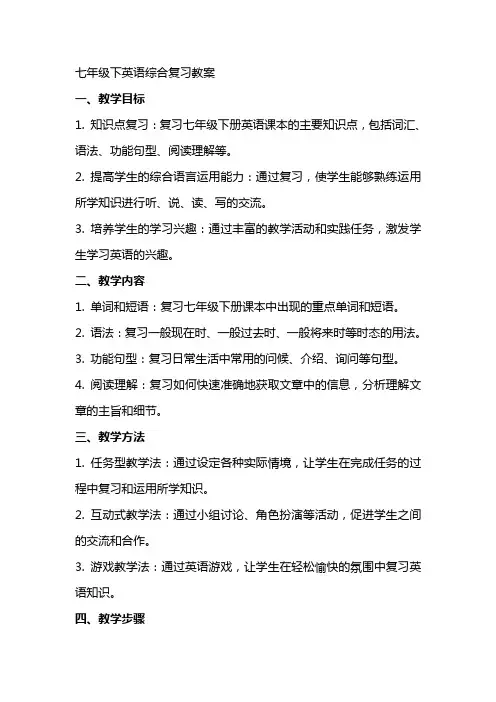
七年级下英语综合复习教案一、教学目标1. 知识点复习:复习七年级下册英语课本的主要知识点,包括词汇、语法、功能句型、阅读理解等。
2. 提高学生的综合语言运用能力:通过复习,使学生能够熟练运用所学知识进行听、说、读、写的交流。
3. 培养学生的学习兴趣:通过丰富的教学活动和实践任务,激发学生学习英语的兴趣。
二、教学内容1. 单词和短语:复习七年级下册课本中出现的重点单词和短语。
2. 语法:复习一般现在时、一般过去时、一般将来时等时态的用法。
3. 功能句型:复习日常生活中常用的问候、介绍、询问等句型。
4. 阅读理解:复习如何快速准确地获取文章中的信息,分析理解文章的主旨和细节。
三、教学方法1. 任务型教学法:通过设定各种实际情境,让学生在完成任务的过程中复习和运用所学知识。
2. 互动式教学法:通过小组讨论、角色扮演等活动,促进学生之间的交流和合作。
3. 游戏教学法:通过英语游戏,让学生在轻松愉快的氛围中复习英语知识。
四、教学步骤1. 单词和短语复习:通过闪卡、竞赛等方式复习重点单词和短语。
2. 语法复习:通过例句、练习等形式复习时态的用法。
3. 功能句型复习:通过情景模拟、对话练习等方式复习常用句型。
4. 阅读理解复习:通过阅读练习、信息匹配等形式复习阅读理解技巧。
五、作业与评价1. 作业:布置相关的练习题,让学生巩固所学知识。
2. 评价:通过课堂表现、作业完成情况、测试成绩等多种方式对学生进行综合评价。
六、教学目标1. 知识巩固:通过复习,使学生能够巩固七年级下册英语课本的主要知识点,包括词汇、语法、功能句型、阅读理解等。
2. 提升口语表达能力:通过小组讨论、角色扮演等活动,提高学生的英语口语表达能力。
七、教学内容1. 单词和短语:继续复习七年级下册课本中出现的重点单词和短语,巩固记忆。
2. 语法:通过实例和练习,进一步巩固时态、语态等语法知识。
3. 功能句型:结合情境,巩固日常生活中的常用句型,提高学生的实际应用能力。
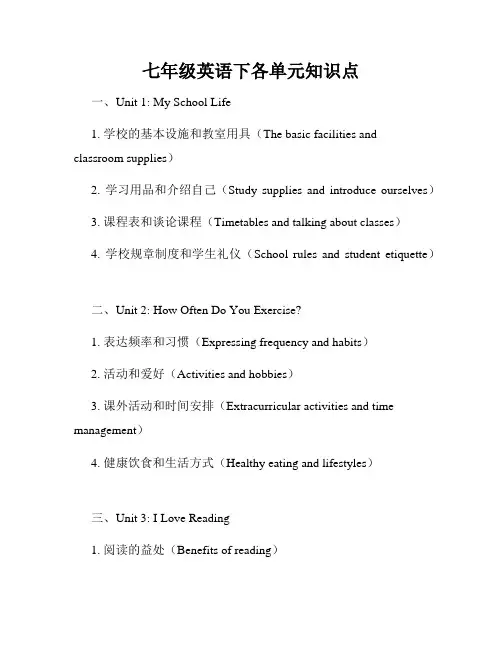
七年级英语下各单元知识点一、Unit 1: My School Life1. 学校的基本设施和教室用具(The basic facilities and classroom supplies)2. 学习用品和介绍自己(Study supplies and introduce ourselves)3. 课程表和谈论课程(Timetables and talking about classes)4. 学校规章制度和学生礼仪(School rules and student etiquette)二、Unit 2: How Often Do You Exercise?1. 表达频率和习惯(Expressing frequency and habits)2. 活动和爱好(Activities and hobbies)3. 课外活动和时间安排(Extracurricular activities and time management)4. 健康饮食和生活方式(Healthy eating and lifestyles)三、Unit 3: I Love Reading1. 阅读的益处(Benefits of reading)2. 图书馆和借书(Library and borrowing books)3. 阅读材料和阅读技巧(Reading materials and reading skills)4. 书评和阅读活动(Book reviews and reading activities)四、Unit 4: Our World1. 国家和国家文化(Countries and national cultures)2. 语言和交流(Language and communication)3. 地理和景点(Geography and landmarks)4. 国际节日和文化庆典(International festivals and cultural celebrations)五、Unit 5: Travel Time1. 旅游的准备(Preparation for travel)2. 交通工具和路线(Transportation and routes)3. 旅游目的地和景点(Tourist destinations and attractions)4. 旅游的个人体验和旅游业的作用(Personal experiences of travel and the role of tourism)六、Unit 6: Protecting Our Environment1. 环境保护的意义和挑战(Significance and challenges of environmental protection)2. 环境问题和解决方案(Environmental problems and solutions)3. 探索自然和地球保护(Exploring nature and protecting the earth)4. 个人责任和环保行动(Individual responsibility and environmental actions)七、Unit 7: Food and Drink1. 不同国家的饮食文化(Cuisine and food culture in different countries)2. 饮食文化和健康(Dietary culture and health)3. 食品安全和保护(Food safety and protection)4. 饮食决策和个人选择(Diet decisions and personal choices)八、Unit 8: Fashion and Shopping1. 时尚和服装文化(Fashion and clothing culture)2. 购物场所和购物习惯(Shopping places and shopping habits)3. 购物节和消费习惯(Shopping festivals and consumption habits)4. 消费观和可持续消费(Consumerism and sustainable consumption)九、Unit 9: Jobs and Work1. 工作选择和职业规划(Career choices and career planning)2. 工作场所和工作时间(Workplace and work schedules)3. 工作技能和职业发展(Work skills and professional development)4. 工作文化和课题解决(Work culture and problem solving)十、Unit 10: Health and Fitness1. 健康生活方式和身体检查(Healthy lifestyles and physical checkups)2. 心理健康和社交能力(Mental health and social skills)3. 健身和运动习惯(Fitness and exercise habits)4. 疾病预防和健康教育(Disease prevention and health education)综上所述,七年级英语下各单元的知识点紧密结合日常生活,让学生在学习中更加了解和熟悉英语在现实生活中的应用,同时也丰富了学生的语言技能,提高了其语言表达和交流能力。
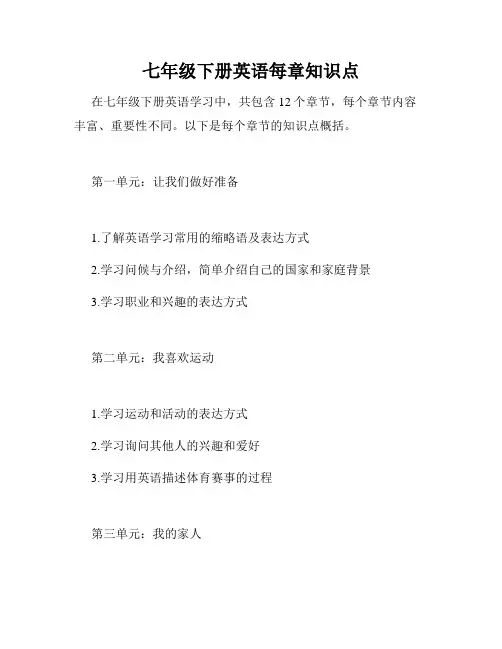
七年级下册英语每章知识点在七年级下册英语学习中,共包含12个章节,每个章节内容丰富、重要性不同。
以下是每个章节的知识点概括。
第一单元:让我们做好准备1.了解英语学习常用的缩略语及表达方式2.学习问候与介绍,简单介绍自己的国家和家庭背景3.学习职业和兴趣的表达方式第二单元:我喜欢运动1.学习运动和活动的表达方式2.学习询问其他人的兴趣和爱好3.学习用英语描述体育赛事的过程第三单元:我的家人1.学习介绍自己家庭成员的英语表达方式2.学习询问别人的家庭情况的英语表达方式第四单元:我的学校生活1.学习学校及课堂用具的英语表达方式2.学习课程的英语表达方式3.学习询问同学们的课程安排的英语表达方式第五单元:我的一天1.学习描述一天的日常活动的英语表达方式2.学习询问其他人一天的日程安排的英语表达方式第六单元:我喜欢食品1.学习各种饮食名称和特点的英语表达方式2.学习询问别人饮食偏好的英语表达方式第七单元:我想要去旅行1.学习旅行目的地和交通方式的英语表达方式2.学习询问旅行信息的英语表达方式第八单元:春节1.学习春节传统习俗的英语表达方式2.学习询问春节节日计划和准备情况的英语表达方式第九单元:白天与黑夜1.学习描述日出和日落的英语表达方式2.学习描述不同时区时间的英语表达方式第十单元:我会打乒乓球1.学习体育运动相关词汇和句型的英语表达方式2.学习询问别人的打球技能和经验的英语表达方式第十一单元:购物1.学习购买物品的英语表达方式2.学习表达对衣服、鞋子和配件的喜好和不喜欢第十二单元:海洋世界1.学习描述海洋生物及其特点的英语表达方式2.学习询问关于海洋生物和环境问题的英语表达方式。
以上是七年级下册英语每章知识点的内容概括。
希望能对初学者和英语爱好者有所指导,加强对英语学习的认识,提高英语交往能力,进一步提升英语水平。
gui t ar 吉他s i ng 唱歌s wi m 游泳dance 跳舞dr aw 画ches s 国际象棋s peak 说(某种语言);说话j oi n 参加,加入cl ub 俱乐部,社团t el l 讲述;告诉wr i t e 写作;写字pi ano 钢琴dr um 鼓vi ol i n 小提琴m us i ci an 音乐家t al k 谈话s how演出;表演j oi n t he ar tcl ub 参加美术小组/俱乐部pl ay t he gui t ar 弹吉他t el l s t or i es 讲故事be good w i t h...和……相处很好;善于应付……m ake f r i ends 结交朋友be good at ...擅长于……hel p s b.wi t h st h.在某方面帮助某人on t he weekend 在周末1.I want t o j oi n t he ar t cl ub.我想参加美术俱乐部。
wantt o do s t h.想做某事例如:I w ant t o go t o t he z oo t hi s Sat ur day.我想这周六去动物园。
2.C al l M r .B r ow n at 293-7742.拨打293-7742找布朗先生。
cal ls b.at ...拨打……找某人例如:Pl eas e cal l ourm anager at 512-3423.请拨打512-3423找我们的经理。
情态动词can 的用法can 表示“能够做某事”,也可以表示请求。
其否定式为can ’t,表示“不能够做某事”,或者表示推测,意为“不可能”。
例如:1.Can you be her e at s i x o ’cl ock t om or r ow m or ni ng?(表请求)你明天早上6点到这里可以吗?2.I can ’tgo s hoppi ng wi t h you t oday.(表示“不能够”)我今天不能陪你去购物。
Unit 1 Can you play the guitar?Section A (1a-2d)一、教学目标:1. 语言知识目标:1) 能掌握以下单词:guitar, sing, swim, dance, chess, play chess, draw, speak, speak English, join, club能掌握以下句型:①—Can you play the guitar? —Yes, I can./ No, I can't.②—What can you do? —I can dance.③—What club do you want to join? —I want to join the chess club.2) 能了解以下语法:情态动词can的用法want to do sth.的用法二、教学重难点1. 教学重点:1) 学习询问和谈论彼此的能力和特长;2) 掌握一些弹奏乐器的表达方式。
2. 教学难点:情态动词can的构成和使用。
三、教学过程Ⅰ. Lead in1. 教师可携带一些易于演奏的乐器,也可带一些演奏乐器的图片,一边演示乐器,一边说: Ican play the guitar.…等;再指着图片说:He/She can play the violin.But I can’t play it.等;然后询问学生:Can you play the guitar?….并引导学生进行简单的回答。
2. S s look at the picture in 1a. Then read the words and phrases. Let Ss match the activities with thepeople.Then Check the answers with the class together.Ⅱ. Presentation出示一些反映各种活动的图片、幻灯片或播放课件,引导学生谈论活动:He/She can dance/swim/sing/"··But I can’t dance/swim/sing/...等,学习表达活动的动词短语。
以下是七年级下册英语各单元的知识点归纳:第一单元:1. 重点单词和短语:学习掌握动词的一般现在时态,了解动词第三人称单数形式的变化规则,学习使用频率副词和情态动词。
2. 重要语法点:掌握一般现在时态的基本用法,包括第三人称单数形式的变化规则和动词的正确形式。
3. 阅读技巧:学习通过上下文理解生词的含义,掌握快速阅读的方法。
4. 写作技能:学习写简单的日记和描述日常活动的文章。
第二单元:1. 重点单词和短语:学习表示位置和方向的介词和副词,如in、on、under、behind等。
2. 重要语法点:掌握使用介词和副词表示位置和方向的方法,理解there be 句型的基本用法。
3. 阅读技巧:学习通过图片和标题理解文章内容,掌握猜测词义的方法。
4. 写作技能:学习写描述物体位置的文章。
第三单元:1. 重点单词和短语:学习表示时间的介词和连词,如at、on、in、before、after等。
2. 重要语法点:掌握使用介词和连词表示时间的方法,理解一般过去时态的基本用法。
3. 阅读技巧:学习通过时间轴理解文章内容,掌握寻找具体信息的方法。
4. 写作技能:学习写描述时间安排的文章。
第四单元:1. 重点单词和短语:学习表示喜怒哀乐的形容词和动词,如happy、sad、angry、worried等。
2. 重要语法点:掌握使用形容词和动词表达情感的方法,理解使用情态动词的一般现在时态。
3. 阅读技巧:学习通过情感线索理解文章内容,掌握推理判断的方法。
4. 写作技能:学习写描述情感变化的文章。
第五单元:1. 重点单词和短语:学习表示建议和请求的句型和表达方式,如Can you help me?、How about going shopping?等。
2. 重要语法点:掌握使用情态动词表示建议和请求的方法,理解使用一般现在时态的祈使句。
3. 阅读技巧:学习通过对话理解文章内容,掌握猜测词义的方法。
4. 写作技能:学习写建议信或请求信。
七年级下复习教案
大单元教学设计一,单元内容分析(课标分析)
二,单元教学目标
三,学情分析
总复习阶段,学生的态度总体较为积极。
绝大多数学生对英语总复习持有较高的兴趣和主动学习态度。
他们愿意参与课堂活动,并愿意主动与教师和同学进行交流。
然而,也有一部分学生对英语复习缺乏热情,需要教师的教育和激励,大部分学生的英语整体水平较为均衡。
大多数学生能够熟练掌握基本的英语语法和词汇,并能够进行简单的听说读写。
然而,仍有一部分学生的英语水平相对较低,需要额外的支持和指导。
四,教学要点和课时安排
单元分课时设计
单元分课时设计
单元分课时设计。
Unit 1 Can you play the guitar?Section A1A1.join v. 参加,加入(团体、社团、组织)joins 第三人称✓join+ 团体/组织1)join the club 参加社团、俱乐部2)join the army 参军eg. My brother want s to join the army. 我哥哥想参军。
3)join the Young Pioneers 加入少先队(专有名词大写)4)join the NBA 加入(美国)全国篮球协会✓join的用法1)join + sb(动词的人后都用宾格)Do you want to join us? 你想加入我们吗?2)join + sb(宾格)+for thingI want you to join us for the concert.我想让你加入我们一起准备音乐会。
3)join + sb(宾格)+to d o somethingI want to join them to go to the Great Wall.4)join + sb(宾格)+ in d oing somethingCan I join you in playing the game? 我能加入你们一起玩游戏吗?宾格:me/ you/ him/ her/ it/ us/ you/ them/5)join in +( sth)Peter d oesn’t want to join in the conversation. Peter不想加入谈话。
2.club n. 俱乐部、社团(复数clubs)the art club 美术俱乐部the swimming club 游泳俱乐部the English club 英语俱乐部the basketball club 篮球俱乐部the music club 音乐俱乐部3.can 是情态动词,表示“能够,会,能”1)can后加动词原型I can draw;She can sing and dance;They can play the guitar.2)否定式can’t =cannot3) 疑问句式:can+主语+动词原型(你会……吗?)Can he play the chess?Yes, he can/No, he can’t.4)第二个意思:表示请求,征求意见Can I watch TV, Dad? Sure 我能看电视吗?爸爸。
七年级下册英语各单元知识点归纳七年级下册英语共有八个单元,包括Unit 1 Making a difference, Unit 2 Great people, Unit 3 Travel journal, Unit 4 Our world, Unit 5 Sharing, Unit 6 Animal world, Unit 7 Science and technology, Unit 8 Sports and health。
下面对每个单元的知识点进行归纳。
Unit 1 Making a difference:1. 基本动词的用法(is/am/are, have/has, do/does)2. 熟练掌握一般现在时的肯定句、否定句和疑问句的构造3. 可数名词和不可数名词的用法及其与冠词的搭配4. 形容词的基本用法5. 过去式动词的构成6. 宾语从句的引导词that的用法Unit 2 Great people:1. 一般过去时的肯定句、否定句和疑问句的构造2. 练习几个表示过去经历的词组和短语,如was/were, went to, saw, met, had等3. 表示习惯的副词 and used to的用法4. 形容词的最高级的构造及用法5. 练习几个形容词的比较级的构成及用法,如big-bigger, good-better, etc.6. 表示过去的时间状语的用法,如in 1998, last week, etc.Unit 3 Travel journal:1. 用there be句型描述地理位置,如There is a park in the town.第1页/共4页2. 学习有关城市、国家和世界各地的基本名称和信息,如countries, continents, cities, etc.3. 学习询问和描述位置的常用句型,如Where is...? It's in/on...4. 学习询问和描述交通方式的常用句型,如How do you go to...? I go by...5. 学习描述天气的常用句型,如What's the weather like? It'ssunny/cloudy/windy, etc.6. 学习描述食物的常用句型,如What do you want to eat? I want to eat...7. 学习描述节日和活动的常用句型,如Is there a...? Yes, thereis./No, there isn't.Unit 4 Our world:1. 学习地点介词的基本用法,如in, on, at等2. 学习描述日常活动的句型,如I get up at 7:00. He goes to school by bike, etc.3. 学习询问和描述时间的句型,如What time do you...? I... at...4. 学习表示频率的副词的用法,如always, usually, often, sometimes, never等5. 学习询问和描述日程安排的句型,如What's your plan for...? My plan is to...6. 练习定语从句的引导词和用法,如who, which, where, when等Unit 5 Sharing:1. 学习权限动词can的用法,表示能力、许可和请求2. 学习询问和描述个人能力的句型,如Can you...? I can...3. 学习谈论和分享个人喜好和兴趣的句型,如I like... I'minterested in...4. 学习询问和描述物品的价钱的句型,如How much is/are...? It's... They're...5. 学习询问和描述购物需求的句型,如What do you want? I want...6. 学习名词性物主代词的用法,如mine, yours, his, hers, etc.7. 学习问路和指示方向的句型,如Excuse me, where is...? It's on the left/right.Unit 6 Animal world:1. 学习动物的基本名称,如lion, penguin, tiger, elephant, etc.2. 学习描述动物外貌和特征的形容词,如big, small, tall, short, etc.3. 学习描述动物习性和动作的动词,如eat, run, swim, fly, etc.4. 学习用there is/are句型描述动物的句型,如There is a lion in the zoo.5. 学习询问和描述动物数量的句型,如How many... are there? There are...6. 学习询问和描述动物食物的句型,如What do... eat? They eat...7. 学习常见的动物园动物和其所属的科,如mammals, birds, reptiles, etc.8. 学习描述动物习性和栖息地的句型,如Lions live in Africa. They sleep in the daytime.Unit 7 Science and technology:1. 学习描述科技产品和设备的基本词汇,如mobile phone, computer, TV, etc.2. 学习询问和描述使用科技产品的方式的句型,如How do you...? I... with...3. 学习科技产品的功能和用途的句型,如What can it do? It can...4. 学习询问和描述科技产品的方便之处和不方便之处的句型,如Is it...? Yes, it is./No, it isn't.第3页/共4页5. 学习描述科技产品的发展和创新的句型,如In the past, people... Now, they...Unit 8 Sports and health:1. 学习描述运动和活动的基本词汇,如play basketball, swim, run, dance, etc.2. 学习询问和描述运动和活动的频率的句型,如How often do you...?I... every...3. 学习询问和描述运动的喜好的句型,如What sports do you like? I like...4. 学习询问和描述身体健康状况的句型,如How are you? I'm (I)have a headache, etc.5. 学习描述饮食习惯和作息时间的句型,如I usually... I go to bed at...6. 学习询问和描述健康建议的句型,如What should I do? You should...7. 学习询问和描述身体部位和病痛的句型,如What's wrong with you?I have a sore throat.以上是七年级下册英语各单元的知识点归纳,希望对你有帮助!。
(此文档为word格式,下载后您可任意编辑修改!)七年级下册英语Unit 1 Can you play the guitar ?1、can+动词原形,它不随主语和数而变化。
(1)含有can的肯定句:主语+can+谓语动词的原形+其他。
(2)变一般疑问句时,把can提前:Can+主语+动词原形+其他?肯定回答:Yes,主语+can。
否定回答:No,主语+can't.(3)含有can的否定句:主语+can't+动词的原形+其他。
(4)含有can的特殊疑问句:特殊疑问词+can+主语+动词原形+其他?2、may+动词的原形。
(may为情态动词)一般疑问句是把may提前,肯定回答是:Yes,主语+may。
否定回答是:No,主语+mustn't。
或please don't。
join+某个组织,俱乐部,party,参军,党派等―加入‖Join sb. ―参加到某人中‖ join in (doing)sth ―加入做......,参加某个活动‖ Join in=take part in +活动,比赛3、说某种语言:speak+语言4、play+球、棋、牌;play+the+乐器。
5、擅长于(做)什么:be good at +名词动ing6、帮助某人做某事:about art.9、What club do you want to join?I want to join the chess club and the basketball club.10、What club does Tom want to join? He wants to join the swimming club .11、He can‘t play the viol in or the piano. Can you the English club? Because I want to learn English well.Unit 2 What time do you go to school ?1、what time和when引导的特殊疑问句。
(1)对时间提问用what time,也可以用when。
询问钟点时用what time,询问日期、月份、年份时用when。
(2)询问做某事的时间时,两者可以互换。
(3)其他询问时间的句子:What's the time? =What time is it?现在几点了?时刻表达法:顺读法和逆读法。
(1)顺读法:―钟点+分钟‖直接读数字。
(2)逆读法:借助介词past或to表示,要先说分再说钟点。
A.当分钟不超过30分钟时(包括30分钟),即<或=30,用past表示。
其结构为:―分钟+past+整点‖ 意为―几点过几分‖。
B.当超过30分钟时,即>30,用to表示。
其结构为:―所差分钟(即60—所过分钟数)+to+下一个整点‖,to译成―差‖,差几分钟到几点。
C.当分钟为30分钟用half表示,当分钟为15分钟用a quarter。
2、always 总是>usually 通常>often常常>sometime 有时3、Watch+TV、球赛―观看,观赏‖,特指长时间注视。
See+电影、医生―看见‖,强调看的结果。
Look ―看‖,强调看的动作,look后接宾语时要用介词at。
Read+书刊、杂志―阅读‖4、listen to +宾语6、Take a shower ―淋浴‖ 7、Eat breakfast 吃早餐Go to +地点名词如:go to school go+地点副词如:go 坐火车4.leave for 到……地方去,离开去某地5.take…to…把……带到……6. most students 大多数学生7. from…to…从……到…… 8.think of 想到,想起9.ride bikes 骑自行车10.in other parts of the world 在世界的其他地方11. to school 乘火车去上学14.in places 在一些地方15.go to school by boat乘船去上学16.on the school bus乘坐校车17.be different from和……不同18.one 11-year old boy 一个十一岁大的男孩二、重点知识详解1.take +aanthe+表示交通工具的名词,乘……去某地,是动词短语,在句中作谓语。
He takes the train. take the subway乘地铁take a walk散步take a shower洗个澡take a rest休息一会take a seat 坐下take some medicine 吃药2.by+表示交通工具的单数名词或onin+ aantheone‘s+表示交通工具的单数名词,是介词短语作方式状语。
I get to school by bike. = I get to school on my bike.3.walkridedrivefly+to+地点名词,步行骑自行车开车坐飞机去某地表示乘交通工具方式可以互换表达相同的意义:Take the bus to school=go to school by bus=go to school on a busDrive a car to work=go to work by car=go to work in a carFly to shanghai=go to shanghai by planeair=take thea plane to shanghai=go to shanghai on aanthe plane.4.get表示―到达‖,后接名词需加to,接地点副词不加to.reach 给示到达,是及物动词,其后直接接宾语。
arrive in+大地点arrive at +小地点后接副词不需介词。
5. It takes sb some moneytime to do sth.花费某人多少时间钱做某事Sb pay some money for sth 某人为某物花费多少钱Sb spend some timemoney on sth 某人在做某事或某物上花费时间钱Sb spend some time money (in)doing sth Sth cost sb some money 某物花费某人多少钱6. How far is it from A to B?=How far is Bfrom A?答语有两种:(1)It‘s…metersmileskilometers(away)有……米英里千米(远)(2)It ‗s about ten minutes‘ walk ride.大约有十分钟步行骑车的路程。
7have to 后加动词原形,侧重客观的需要,有―不得不,被迫‖之意,有多种时态形式,否定式为don‘t ‘t)意为―不必‖。
Must 侧重于说话者的主观看法,认为有必要或有义务做某事,只有现在时一种形式,否定式must‘t意为―一定不要,不允许,禁止‖反意词为―needn‘t‖。
8.感谢用语:Thank you very much , Thanksa lot , Many thanks.回答感谢用语的句子:That‘s ok all right. 不用谢。
You are welcome 不客气。
It is my pleasure.My pleasure.It is a pleasure.不客气、那是我的荣幸。
Don‘t mention it。
别在意。
It was nothing at all.那没什么。
三、语法归纳(一)the+交通工具(单数)b. by+交通工具(单数)c. onin+限定词+交通工具2. 用来提问做完某事还需要多长时间,常用于将来时态时,常用―in+时间段‖来回答。
――How soon will you arrive in Beijing?----In 3 ’t eat in class肯定的祈使句:(1) 实义动词原形+其他;(2) be动词原形+形容词+其他;(3) Let sb do sth.否定的祈使句:(1) Don‘t+实义动词+原形;(2) Don‘t be+形容词+其他;(3) Don‘t let sb do sth (4) No+Ving.练:(1) My mother said to me, ―Tom, _______ in bed.‖A. not readB. doesn‘t readC. don‘t readD. didn‘t read(2) Don‘t __________ (fight). = No __________ (fight).2. 不要迟到:late. (arrive = be)上课上学不要迟到:Don‘t arrive (be)3. 主语省略class.主语不省略(有主语)arrive ;ate for class.4. 在学校我们必须穿校服:We stop smoking, doctor. – For your B. may C. must D. my .(never 译为―从来没有‖,表示否定,否定句中表示―任何,一些‖,用any) 7. 不要大声说话:请大声说:8. 他擅长于唱歌:be good at doing sth9. 表示―地点‖的词组:(1)在(2) school 10. 表示―时间‖的词组:(1) 下课后:after class放学后:after school(2)school daysnights(3) 到晚上10p.m.11. (1) with 和;如:He lives in Beijing (不能用and)(2) with 戴着; 如:Do you know theold . (不能用has)Unit5 Why do you like pandas? 1. –让我们先去看考拉。
-- Let‘s see the(first 翻译为―首先‖)–你为什么最喜欢考拉?-- Why doyou (best 翻译为―最‖)--因为它们很可爱。
-- Because they are very cute.let sb do sth 2. –-- Whyyou like tigers?--因为它们有点吓人。
-- Because they are①②3.What后有animals, other不加s)你喜欢和别的年轻人工作吗? Do you This isn‘t my sweater. It‘s __________ (you).Are all these children __________(you)?4. 他是一个8岁的男孩:He is(后有名词boy,用连字符,year 用原形)他8岁: (后无名词boy, 不用连字符,岁数大于1,year 变复数)5. 请保持安静:Please quiet. =Please (keep 译为―保持‖,= be)6. 他每天通常睡和放松20个小时:Hethe day在此处,during = in9.在10. 吃草:eat grass 吃叶子:eat leaves (leaf 的复数形式) 吃肉:eat meat 11. 相似单词比较:(1) 草:grass (不可数,无复数) (2) 玻璃:glass 复数:glasses 眼镜12. 汉语:因为…,所以… 英语:because…, so… (不能同时出现在一个句子中)汉语:虽然…,但是… 英语:though…, but… (只能使用其中一个) 如:_______ Tom is tired, _______ your class?15. (1) very adv. 非常(放在形容词前); 如:(2) very much 非常(放在动词后);16. (1) kind(s) of n. 种类;如:There are What(2) kind of = a little adv. 有点;(无形式变化) 如:(3) kind adj. 和蔼的,友善的;如:It‘s of you to ) with are __________ (lie) on the grass.(3) My brotherand I are__________ (play) soccer.(4) His sister is __________ (read)a book.2. --你正在做什么?--我正在看电视。